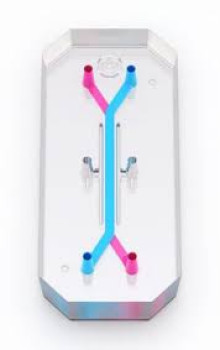Project
Development of an arterial organ-chip to study the role of primary cilia in atherosclerosis
| Primary Investigator: | Prof Martin Knight Queen Mary University of London |
| Co-investigator: | Prof Hazel Screen Queen Mary University of London |
| Funder: | China Scholarship Council |
| Project dates: | 06-09-2021 to 05-09-2025 |
| Centre dates: | 06-09-2021 to 05-09-2025 |
The aetiology of arterial diseases such as atherosclerosis, pulmonary hypertension and aneurysm, is associated with localised chronic inflammation. Activation of NF-κB and related pro-inflammatory pathways by cytokines, including TNFα, IL1β and IFNγ, leads to the expression of adhesion molecules which cause recruitment of inflammatory cells into the blood vessel wall and stimulates atherosclerotic plaque formation. Endothelial cells are exposed to a complex dynamic mechanical environment consisting of shear stresses caused by blood flow and associated pulsatile stretch of the vessel wall. High shear stress in areas of normal blood flow is anti-inflammatory. By contrast disturbed oscillating blood flow and low shear stress, typically around bifurcations, facilitates a pro-inflammatory, atherogenic gene signature. Thus, chronic, localised activation of pro-inflammatory pathways is based on a fine interplay between mechanobiology and inflammation which ultimately leads to serious endothelial dysfunction and associated arterial disease mortality. Endothelial cells express primary cilia which are thought to mediate mechanosensitive vasodilation and protection from atherosclerosis in response to normal blood flow. However, primary cilia are largely absent from areas of the vasculature with normal blood flow and are predominantly found only in areas with disturbed flow that are prone to atherosclerosis. In other cell types, loss of primary cilia and/or associated intraflagellar transport, disrupts pro-inflammatory NF-κB signalling. Studies from Knight's group have shown that mechanical stimuliation causes a loss of cilia expression associated with inhibition of pro-inflammatory signalling. Project hypothesis: We hypothesise that mechanical forces caused by normal blood flow, inhibit NF-κB signalling by disrupting expression of endothelial primary cilia.
Project Aim: The project aims to develop an arterial organ chip that mimics the biomechanical environment that predisposes to atherosclerosis. We will validate this chip and use it to examine the role of primary cilia mechanobiology in aetiology of atherosclerosis and potential new therapeutic strategies involving cilia manipulation.
Project Aim: The project aims to develop an arterial organ chip that mimics the biomechanical environment that predisposes to atherosclerosis. We will validate this chip and use it to examine the role of primary cilia mechanobiology in aetiology of atherosclerosis and potential new therapeutic strategies involving cilia manipulation.



